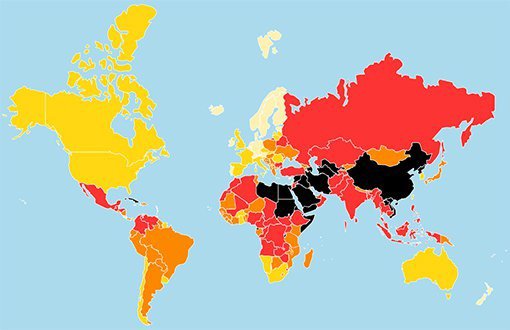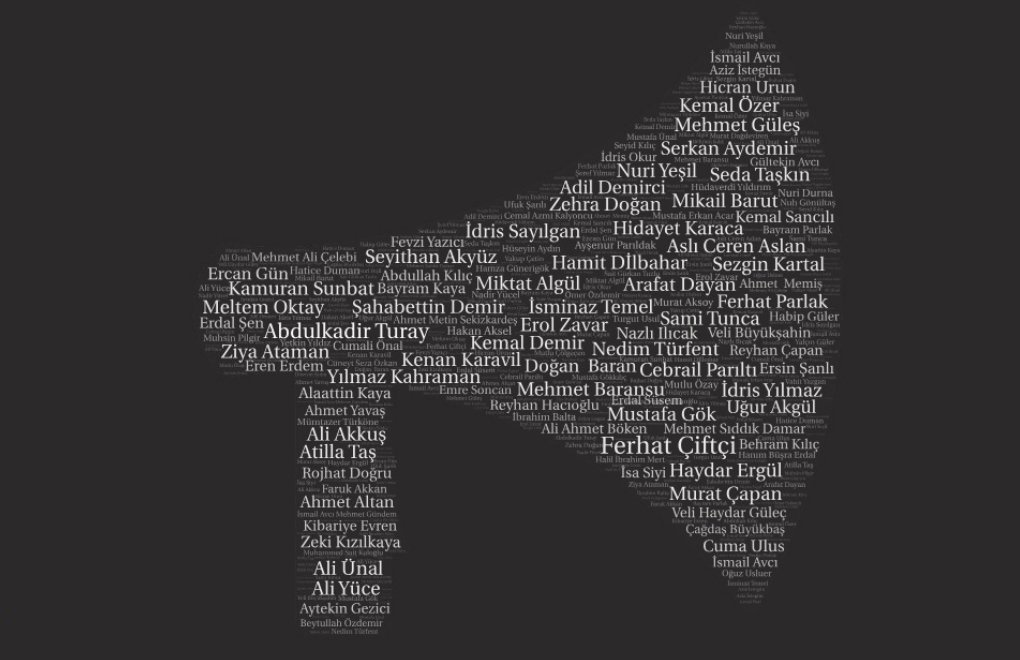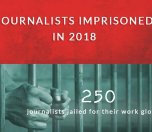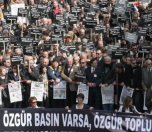Click to read the article in Turkish / Kurdish
Releasing a new report entitled "Democracy At Risk: Threats And Attacks Against Media Freedom In Europe," the Council of Europe has stated that out of 130 journalists who are behind bars in Europe, 110 are in Turkey.
Based on 140 serious violations reported to the Council, the report evaluates the state of freedom of press in Europe.
The report has been prepared by 12 partners of the Council of Europe's Platform for the Protection of Journalism and Safety of Journalists. Secretary General of the Council of Europe Thorbjørn Jagland has announced the report in a meeting in Strasbourg.

Map of the World Press Freedom Index by the Reporters Without Borders (RSF).
Jagland said, "Freedom of expression is crucial for the realization of all other human rights and it deserves the highest attention of our member states. The report can serve as a basis for dialogue with the member states on the ways to improve the media freedom environment."
According to the report, the number of attacks against journalists significantly increased in 2018 compared to previous years. The number of threats reported, including death threats, was doubled.
Also, arbitrary detentions of journalists continued while there has been no progress in a number of long-standing cases of impunity for murder of journalists.
A number of new legislative initiatives have weakened media freedom as well, according to the report.
The report stated that 140 alerts concerning 32 of the 37 Council of Europe member states were submitted to the Platform in 2018.
The Council's report also mentioned the journalist murders that took place last year, saying, "The murders of Daphne Caruana Galizia in Malta in 201776 and of Ján Kuciak and his fiancée in Slovakia in 2018 have dramatically raised public and official awareness in the EU of the twin crisis of journalist safety and impunity."
What does the report say about Turkey?
Defining Turkey as the "the world's biggest jailer of journalists," the report said that 130 journalists across Europe were behind bars and 110 of them were in Turkey at the end of 2018.
"In 2018, journalists in Turkey continued to face extraordinary repression. Despite the official ending of the state of emergency in July 2018, Turkey remains the world's largest imprisoner of journalists and has been rated as one of the worst performers in the world in terms of freedom of expression and media freedom" the report stated.
The report also said, "Since the attempted coup of July 2016, and under the state of emergency which was imposed thereafter, over 200 journalists have been arrested or detained on account of their publications. Arrests of journalists and media workers continued throughout 2018, in particular in the southeast of the country.
The following remarks were also made in the report:
"Evidence obtained through torture is deemed admissible"
The majority of arrested journalists face charges of membership in or
propaganda of various groups considered terrorist organizations by the Turkish government, including the so-called FETÖ movement or the PKK
The use of prolonged solitary confinement against detained journalists
is another issue, with journalists including Deniz Yücel and Nedim Türfent spending months alone, treatment tantamount to torture under ECtHR case law. Evidence obtained through torture has also been deemed admissible by judges in trials against journalists."
"The lower court did not abide by the Constitutional Court's verdict"
The report also mentioned the cases of journalists Mehmet Altan and Şahin Alpay.
"In January 2018, the Constitutional Court of Turkey ruled that the
fundamental rights of journalists Mehmet Altan and Şahin Alpay had been violated by their detention and that the two journalists should be released from custody. Despite the judgment, criminal courts rejected the journalists' request to be freed.
"Under Article 153 of the Turkish Constitution, all Constitutional Court rulings enter into force immediately and are binding for the legislative, executive and judicial organs, including the administration and officials. The decision of the lower court appeared to be the direct result of political pressure, amounting to interference with its independence and indicating a grave violation of the rule of law."
Turkey was one of the four countries which were examined in a separate part in the report. The other three were Italy, Hungary and Russia.
Partners of the Platform for the Protection of Journalism and Safety of JournalistsEuropean Federation Of Journalists, International Federation Of Journalists, Association Of European Journalists, Article 19, Reporters Withour Borders, The Committee To Protect Journalists, Index On Censorship, International Press Institute, International News Safety Institute, The Rory Peck Trust, The European Broadcasting Union, Pen International |
(HA/VK)





-132.jpg)

